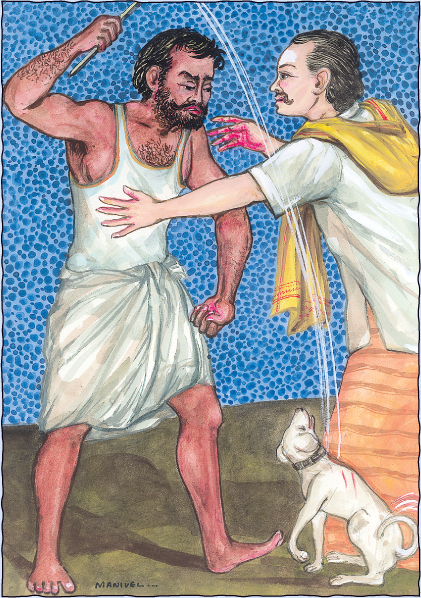THE SIXTH RESTRAINT
Steadfastness
Dhṛiti धृति
 TEADFASTNESS, DHṚITI, IS THE SIXTH YAMA. TO BE STEADFAST, YOU HAVE TO USE YOUR WILLPOWER. WILLPOWER IS DEVELOPED EASILY IN A PERSON WHO HAS AN ADEQUATE memory and good reasoning faculties. To be steadfast as we go through life, we must have a purpose, a plan, persistence and push. Then nothing is impossible within the circumference of our prārabdha karmas.§
TEADFASTNESS, DHṚITI, IS THE SIXTH YAMA. TO BE STEADFAST, YOU HAVE TO USE YOUR WILLPOWER. WILLPOWER IS DEVELOPED EASILY IN A PERSON WHO HAS AN ADEQUATE memory and good reasoning faculties. To be steadfast as we go through life, we must have a purpose, a plan, persistence and push. Then nothing is impossible within the circumference of our prārabdha karmas.§
It is impossible to be steadfast if we are not obeying the other restraints that the ṛishis of the Himalayas laid down for us as the fruits of their wisdom. All of these restraints build character, and dhṛiti, steadfastness, rests on the foundation of good character. Character—the ability to “act with care”—is built slowly, over time, with the help of relatives, preceptors and good-hearted friends. Observe those who are steadfast. You will learn from them. Observe those who are not, and they, too, will teach you. They will teach what you should not do. To be indecisive and changeable is not how we should be on the path to enlightenment, nor to be successful in any other pursuit. Nonperseverance and fear must be overcome, and much effort is required to accomplish this. Daily sādhana, preferably under a guru’s guidance, is suggested here to develop a spiritual will and intellect.§
In the Śāndilya Upanishad, dhṛiti has been described as preserving firmness of mind during the period of gain or loss of relatives. This implies that during times of sorrow, difficult karmas, loss and temptation, when in mental pain and anguish, feeling alone and neglected, we can persevere, be decisive and bring forth the dhṛiti strength within us and thus prevail. One translator of the Varuha Upanishad used the word courage to translate dhṛiti. Courageous and fearless people who are just and honest prevail over all karmas—benevolent, terrible and confused. This virtue is much like the monk’s vow of humility, part of which is enduring hardship with equanimity, ease of mind, which means not panicking. The Tirukural reminds us, “It is the nature of asceticism to patiently endure hardship and to not harm living creatures” (261). And we can say that dhṛiti itself is a “hard ship”—a ship that can endure and persevere on its course even when tossed about on the waves of a turbulent sea.§
Some might wonder why it is good to passively endure hardship. To persevere through hardship one must understand, as all Hindus do, that any hardship coming to us we ourselves participated in setting into motion in the past. To endure hardship and rise above it in consciousness is to overcome that karma forever. To resent hardship, to fight it, is to have it return later at a most inconvenient time.§
An essential part of steadfastness is overcoming changeableness. Changeableness means indecision, not being decisive, changing one’s mind after making a deliberate, positive decision. Changing one’s mind can be a positive thing, but making a firm, well-considered decision and not following it through would gain one the reputation of not being dependable, even of being weak-minded. No one wants a reputation like this.§
How can we discriminate between this and the strength of a person who changes his or her mind in wisdom because of changes of circumstance? A person who is changeable is fickle and unsure of himself, changing without purpose or reason. Dhṛiti, steadfastness, describes the mind that is willing to change for mature reasons based on new information but holds steady to its determinations through thick and thin in the absence of such good reasons. Its decisions are based on wise discrimination. A person who is patient and truthful, who would not harm others by thought, word or deed and who is compassionate and honest has the strong nature of one who is firm in dhṛiti, steadfastness. He is the prevailer over obstacles. One firm in dhṛiti can be leaned upon by others, depended upon. He is charitable, has faith in God, Gods and guru, worships daily and manifests in his life a spiritual will and intellect. In relaxed moments he experiences santosha, contentment, not being preoccupied by feelings of responsibility, duty or things left undone.§
The spiritual path is a long, enduring process. It does not reach fruition in a year or two years. The spiritual path brings lots of ups and downs, and the greatest challenges will come to the greatest souls. With this in mind, it becomes clear that steadiness and perseverance are absolutely essential on the spiritual path.§

